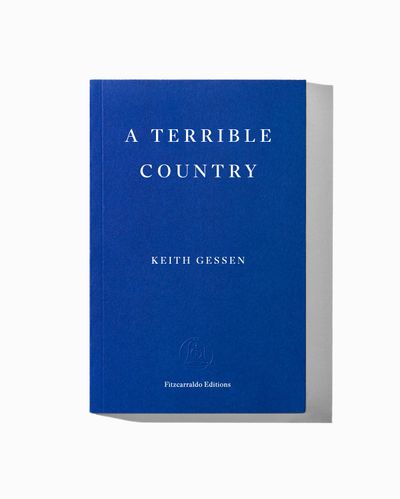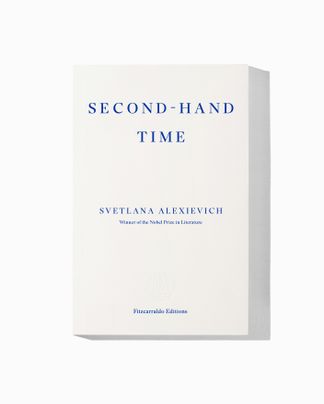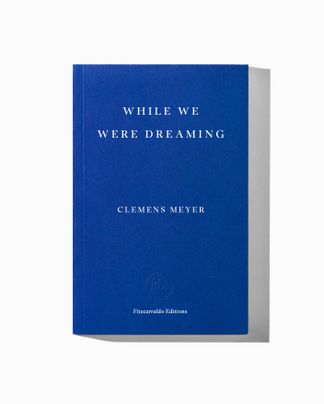In the summer of 2008, Andrei Kaplan moves from New York to Moscow to look after his ageing grandmother, a woman who survived the dark days of communism and witnessed Russia’s violent capitalist transformation. She welcomes Andrei into her home, even if she can’t always remember who he is. Andrei learns to navigate Putin’s Moscow, still the city of his birth, but with more expensive coffee. He looks after his elderly – but surprisingly sharp! – grandmother, finds a place to play hockey, a café to send emails, and eventually some friends, including a beautiful young activist named Yulia. Capturing with a miniaturist’s brush the unfolding demands of family, fortune, personal ambition, ideology, and desire, A Terrible Country is a compelling novel about ageing, radical politics, Russia at a crossroads, and the difficulty – or impossibility – of actually changing one’s life.

A Terrible Country
French paperback with flaps, 424 pages
Published 10 July 2018
A Terrible Country
I.
I MOVE TO MOSCOW
In the late summer of 2008, I moved to Moscow to take care of my grandmother. She was about to turn ninety and I hadn’t seen her for nearly a decade. My brother Dima and I were her only family; her lone daughter, our mother, had died years earlier. Baba Seva lived alone now in her old Moscow apartment. When I called to tell her I was coming, she sounded very happy to hear it, and also a little confused.
My parents and my brother and I left the Soviet Union in 1981. I was six and Dima was sixteen, and that made all the difference. I became an American, whereas Dima remained essentially Russian. As soon as the Soviet Union collapsed, he returned to Moscow to make his fortune. Since then he had made and lost several fortunes; where things stood now I wasn’t sure. But one day he Gchatted me to ask if I could come to Moscow and stay with Baba Seva while he went to London for an unspecified period of time.
“Why do you need to go to London?”
“I’ll explain when I see you.”
“You want me to drop everything and travel halfway across the world and you can’t even tell me why?”
There was something petulant that came out of me when dealing with my older brother. I hated it, and couldn’t help myself.
Dima said, “If you don’t want to come, say so. But I’m not discussing this on Gchat.”
“You know,” I said, “there’s a way to take it off the record. No one will be able to see it.”
“Don’t be an idiot.”
He meant to say that he was involved with some very serious people, who would not so easily be deterred from reading his Gchats. Maybe that was true, maybe it wasn’t. With Dima the line between those concepts was always shifting.
As for me, I wasn’t really an idiot. But neither was I not an idiot. I had spent four long years of college and then eight much longer years of grad school studying Russian literature and history, drinking beer, and winning the Grad Student Cup hockey tournament (five times!); then I had gone out onto the job market for three straight years, with zero results. By the time Dima wrote me I had exhausted all the available post-graduate fellowships and had signed up to teach online sections in the university’s new PMOOC initiative, short for “paid massive online open course,” although the “paid” part mostly referred to the students, who really did need to pay, and less to the instructors, who were paid very little. It was definitely not enough to continue living, even very frugally, in New York. In short, on the question of whether I was an idiot, there was evidence on both sides.
Dima writing me when he did was, on the one hand, providential. On the other hand, Dima had a way of getting people involved in undertakings that were not in their best interests. He had once convinced his now former best friend Tom to move to Moscow to open a bakery. Unfortunately, Tom opened his bakery too close to another bakery, and was lucky to leave Moscow with just a dislocated shoulder. Anyway, I proceeded cautiously. I said, “Can I stay at your place?” Back in 1999, after the Russian economic collapse, Dima bought the apartment directly across the landing from my grandmother’s, so helping her out from there would be easy.
“I’m subletting it,” said Dima. “But you can stay in our bedroom in Grandma’s place. It’s pretty clean.”
“I’m thirty-three years old,” I said, meaning too old to live with my grandmother.
“You want to rent your own place, be my guest. But it’ll have to be pretty close to Grandma’s.”
Our grandmother lived in the center of Moscow. The rents there were almost as high as Manhattan’s. On my PMOOC salary I would be able to rent approximately an armchair.
“Can I use your car?”
“I sold it.”
“Dude. How long are you leaving for?”
“I don’t know,” said Dima. “And I already left.”
“Oh,” I said. He was already in London. He must have left in a hurry.
But I in turn was desperate to leave New York. The last of my old classmates from the Slavic department had recently left for a new job, in California, and my girlfriend of six months, Sarah, had recently dumped me at a Starbucks. “I just don’t see where this is going,” she had said, meaning I suppose our relationship, but suggesting in fact my entire life. And she was right: even the thing that I had once most enjoyed doing—reading and writing about and teaching Russian literature and history—was no longer any fun. I was heading into a future of halfheartedly grading the half-written papers of half-interested students, with no end in sight.
Whereas Moscow was a special place for me. It was the city where my parents had grown up, where they had met; it was the city where I was born. It was a big, ugly, dangerous city, but also the cradle of Russian civilization. Even when Peter the Great abandoned it for St. Petersburg in 1713, even when Napoleon sacked it in 1812, Moscow remained, as Alexander Herzen put it, the capital of the Russian people. “They recognized their ties of blood to Moscow by the pain they felt at losing it.” Yes. And I hadn’t been there in years. Over the course of a few grad-school summers I’d grown tired of its poverty and hopelessness. The aggressive drunks on the subway; the thugs in tracksuits and leather jackets walking around eyeing everyone; the guy eating from the dumpster next to my grandmother’s place every night during the summer I spent there in 2000, periodically yelling “Fuckers! Bloodsuckers!” then going back to eating. I hadn’t been back since.
Still, I kept my hands off the keyboard. I needed some kind of concession from Dima, if only for my pride.
I said, “Is there someplace for me to play hockey?” As my academic career had declined, my hockey playing had ramped up. Even during the summer, I was on the ice three days a week.
“Are you kidding?” said Dima. “Moscow is a hockey mecca. They’re building new rinks all the time. I’ll get you into a game as soon as you get here.”
I took that in.
“Oh, and the wireless signal from my place reaches across the landing,” Dima said. “Free wi‑fi.”
“OK!” I wrote.
“OK?”
“Yeah,” I said. “Why not.”
(…)
LA Times Best Books of 2018 | NYLON Best Books 2018 | The White Review Books of the Year 2018
‘Keith Gessen’s second novel is a very funny, perceptive, exasperated, loving and timely portrait of a country that its author clearly knows well…. The refreshingly artless writing belies a deep understanding of Russia, its history and literature. Andrei digresses enlighteningly on Russian as a literary language, swearing, taxis, plumbing, ice hockey and the role played by global oil prices in the breakup of the Soviet Union…. If the last two bizarre years have taught us anything, it’s that Russia is never irrelevant. I wonder how many more drugged spies, bent elections and political murders it will take for the rest of the world to realise that, for existential reasons, it would be smart for us to pay it a little more consistent and nuanced attention. A Terrible Country would be an excellent and entertaining place to begin.’
— Marcel Theroux, Guardian
‘Gessen evokes not only convincingly, but indispensably, something exceedingly rare in modern American fiction: genuine male vulnerability. There’s enough heart here to redeem every recent male novel that’s aimed for it and found solipsism instead.… The novel manages to offer hard-won insight into an impossible place.… You won’t read a more observant book about the country that has now been America’s bedeviling foil for almost a century.’
— Boris Fishman, New York Times Book Review
‘A cause for celebration: big-hearted, witty, warm, compulsively readable, earnest, funny, full of that kind of joyful sadness I associate with Russia and its writers. Gessen’s particular gift is his ability to effortlessly and charmingly engage with big ideas – power, responsibility, despotism of various stripes, the question of what a country is supposed to do for the people who live in it – while still managing to tell a moving and entertaining human story. At a time when people are wondering whether art can rise to the current confusing political moment, this novel is a reassurance, from a wonderful and important writer.’
— George Saunders, author of Lincoln in the Bardo
‘A Terrible Country is even better than I hoped. By turns sad, funny, bewildering, revelatory, and then sad again, it recreates the historical-psychological experience of returning, for twenty-first-century reasons, to a country one’s parents left in the twentieth century. It’s at once an old-fashioned novel about the interplay between generational roles, family fates, and political ideology, and a kind of global detective mystery about neo-liberalism (plus a secret map of Moscow in terms of pickup hockey). Gessen is a master journalist and essayist, as well as a storyteller with a scary grasp on the human heartstrings, and A Terrible Country unites the personal and political as only the best novels do.’
— Elif Batuman, author of The Idiot
‘Like Primo Levi’s masterpiece If Not Now, When?, A Terrible Country makes the emotional case for an unfamiliar politics. Its critique of the Russian mafia state is balanced by a deeply humanistic attention to common decency. I would not hesitate to recommend this novel to a busy person who otherwise refuses to touch fiction. The only up-to-the-minute, topical, relevant, and necessary novel of 2018 that never has to mention Trump.’
— Nell Zink, author of The Wallcreeper
‘A Terrible Country is an engaging and entertaining novel, full of humor and humility, and always after one thing—the truth of contemporary life. Gessen gives us the people of Moscow – businessmen, anarchists, grandmothers, dissidents, baristas, hockey goalies, prostitutes, and FSB agents – not as fanciful characters but with the full force of the real. His affectionate, clear-eyed portrait of one terrible country has plenty to teach us about our own.’
— Chad Harbach, author of The Art of Fielding
‘I loved A Terrible Country, and I loved Andrei, the smart, likeable narrator, a struggling American academic with a deliciously wry observational intelligence. I’d follow Andrei’s voice anywhere, but I was especially glad, at this moment, to go with him to post-Soviet Moscow. A fun, funny but sincere novel that explores with real integrity what it means to be an American ex-pat who can always leave, A Terrible Country is one of the most addictive and affecting books I’ve read in a while.’
— Adelle Waldman, author of The Love Affairs of Nathaniel P.
‘Keith Gessen has written a poignant yet laugh-out-loud portrait of the new Russia of nightclubs, black Audis, and Wifi cafés, still haunted by an old Russia of kasha, hockey, and Soviet movies. A Terrible Country is a serious book that’s a pleasure to read, full of love and sorrow.’
— Caleb Crain, author of Necessary Errors
‘For those of us who have grown up reading Russian literature, from Chekhov to Babel to Svetlana Alexievich, following this Americanized narrator through his return to contemporary Moscow offers an education and pure delight.’
— Mona Simpson, author of Casebook and Anywhere but Here
‘This earnest and wistful but serious book gets good, and then it gets very good … [Gessen] writes incisively about many things here but especially about, as the old saw has it, how it is easier to fight for your principles than live up to them … This artful and autumnal novel, published in high summer, is a gift for those who wish to receive it.’
—Dwight Garner, New York Times
‘Excellent … In its breadth and depth, its sweep, its ability to move us and philosophize … A Terrible Country is a smart, enjoyable, modern take on what we think of, admiringly, as “the Russian novel” – in this case, a Russian novel that only an American could have written.’
—Francine Prose, New York Review of Books
‘A Terrible Country tells the reader a lot about contemporary Russia and, importantly, lifts the lid on domestic political resistance to Putin. But what makes this a moving and thought-provoking novel is Andrei’s personal struggle to find his way in the world, his sense of obligation to his family and his realisation that his parents’ emigration – the very thing that has afforded him opportunities – was “the great tragedy of my grandmother’s life”.’
— Max Liu, Financial Times
‘Taking such an intimate trip through the recent past of Putin’s Russia is fascinating, made more so by the presence of Andrei’s lively, sorrowful, unpredictable grandmother.’
— Vanity Fair
‘With wit and humor, Gessen delivers a heartwarming novel about the multitudinous winding roads that lead us home.’
— Library Journal (starred review)
‘[A] lighthearted yet morally serious novel.’
—Vadim Nikitin, London Review of Books
‘Hilarious, heartbreaking … A Terrible Country may be one of the best books you’ll read this year … One of the pleasures of the novel is listening to Andrei’s hyper-intelligent, wry and ironic voice … The other unforgettable character is Andrei’s grandmother, an indomitable force of nature. Gessen’s portrait of her is tender, and readers will be hard-pressed to find a more nuanced and poignant depiction of what it means to lose your memory … Gessen’s genius is in showing us how and why Russia is and isn’t a terrible country. And how, in its ruthless devotion to market capitalism, the former socialist state bears a striking resemblance to our own.’
—Ann Levin, Associated Press
‘Hilarious … To understand Russia, read A Terrible Country.’
—Time
‘[Andrei’s] wry observations about Moscow’s day-to-day – his tour through his own family history, his grandmother’s stuck-in-time apartment, his struggle to join hockey games and party in nightclubs are completely engrossing. It’s portraiture, showing us a place we may think we know but don’t … A Terrible Country is a splendid guidebook.’
—Entertainment Weekly
‘My own feelings towards this complexly ambivalent novel aren’t complex or ambivalent in the least. I loved it and expect others will too.’
— Boston Globe
‘A Terrible Country … has a spare emotional force, as beautiful as it is painful; [the novel] serves as a keen document of history past and present; builds in an unlikely way to the suspenseful climax of a taut (and very human) political thriller; and is the funniest work of fiction I’ve read this year.’
—Christian Lorentzen, Vulture
Keith Gessen is the author of A Terrible Country, All the Sad Young Literary Men and a founding editor of n+1. He edited and co-translated Kirill Medvedev’s It’s No Good, also published by Fitzcarraldo Editions, and translated Nobel Prize-winner Svetlana Alexievich’s Voices from Chernobyl. He teaches journalism at Columbia and lives in New York.




